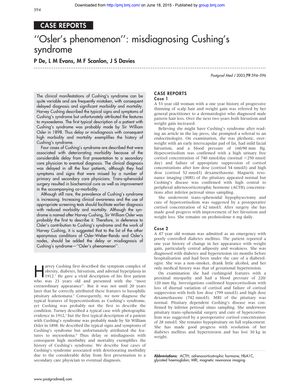TLDR Doctors often diagnose Cushing's syndrome late, which worsens symptoms; earlier detection is needed.
The document from 2003 discusses the issue of misdiagnosing Cushing's syndrome, a condition with symptoms like obesity, diabetes, hirsutism, and adrenal hyperplasia. It presents four case reports where patients had a delayed diagnosis ranging from six months to ten years, leading to worsening symptoms. The delay is attributed to the perceived rarity of the condition, and the authors suggest that increased clinical awareness and appropriate screening could lead to earlier diagnosis. They propose the term "Osler's phenomenon" to describe the misdiagnosis or delay in diagnosing Cushing's syndrome, acknowledging Sir William Osler's early work on the condition.
 42 citations
,
November 2019 in “Frontiers in Endocrinology”
42 citations
,
November 2019 in “Frontiers in Endocrinology” The document suggests creating a validated score to diagnose Cushing's Syndrome and considers plasma steroid profiling as a simpler diagnostic method.
 926 citations
,
June 2010 in “BMC Medicine”
926 citations
,
June 2010 in “BMC Medicine” Polycystic ovary syndrome is a complex condition that affects women's mental, reproductive, and metabolic health throughout their lives.
 97 citations
,
July 2006 in “Dermatologic therapy”
97 citations
,
July 2006 in “Dermatologic therapy” The document concludes that accurate diagnosis and personalized treatment are important for skin problems in women with PCOS.
 27 citations
,
December 2016 in “Dermatology and Therapy”
27 citations
,
December 2016 in “Dermatology and Therapy” Certain skin conditions can indicate insulin resistance and should prompt lifestyle changes and medical treatment to manage underlying health issues.
 38 citations
,
June 2004 in “Human Reproduction”
38 citations
,
June 2004 in “Human Reproduction” The document suggests that clinical trials for PCOS should focus on meaningful primary outcomes like live birth rates, rather than less reliable surrogate markers.
 60 citations
,
February 2010 in “Gynecological Endocrinology”
60 citations
,
February 2010 in “Gynecological Endocrinology” Metformin combined with lifestyle changes improves insulin resistance and reduces testosterone levels in women with PCOS more than lifestyle changes alone.






